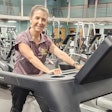
When Courtney Thomas worked as an intramural flag football referee during her freshman year at Texas Christian University, she “was absolutely terrible” and — facing other external stressors of adjusting to college life — she quit.
Not long after quitting, Thomas had a realization. “I needed a job and a support system and went to my supervisor at the time and told him I was having a really hard time adjusting to college life,” remembers Thomas, now assistant director of facilities for University of North Texas Recreational Sports. “He not only gave me a job for the second time, but he got my academic career back on track. It was almost like an intervention, and if I hadn’t had him to support me, I would not be where I am today.”
Thomas, an early childhood education major, didn’t return to the football field, but she did become a participant services assistant and then an intramural supervisor. From there, her professional path unfolded. She helped establish a competitive sports graduate assistantship in campus recreation at TCU, a position she filled while participating in an accelerated master’s program in curriculum studies. Today, Thomas oversees a large team of student employees at UNT’s Pohl Recreation Center and understands how valuable student jobs can be.
“I had that support system the whole way through,” she says. “My love for development just really came out of being a student supervisor and having someone who believed in me before I believed in myself.”
In 2025, convincing college students to believe in themselves, even those who have some of the best jobs on campus, working in the recreation center, is a major challenge.
“COVID definitely changed the landscape for the level of skills that students have coming into college,” says Carson Petersheim, assistant director of student development for University of Illinois Campus Recreation. “Just in my own personal experience, more time and energy are needed to dedicate to students to get them to that baseline level they were at before the pandemic.”
Most student bodies on campuses today were in high school or middle school when the pandemic hit, and Petersheim notes that they became so accustomed to doing things virtually that their people and time management skills suffered — all the more reason to establish or expand student development positions within campus recreation departments. Petersheim is chair of the NIRSA Student Staff Development Committee, which develops resources and learning opportunities for students and their professional supervisors. Current resources include a “Campus Rec Essentials” book titled Student Staff Training and Development and related “Ideas in Motion” roundtable sessions scheduled for this summer.
“Student development positions are becoming more relevant and prevalent,” Petersheim says. “It doesn’t necessarily matter if it’s a large university or a small college. People are just seeing a greater need for them.”
Leadership is a choice
Not all students work in a campus recreation center because they eventually want to do so professionally. Some simply consider the facility a fun place to be, with plenty of opportunities for connection and socialization.
NIRSA recognizes the importance of supporting and motivating all campus recreation employees — both professional and student staff. The association’s 2024-2027 Strategic Framework focuses on the evolving challenges associated with working in the field.
“Participant and employee engagement in campus recreation is changing,” according to the framework document. “This impacts who is entering the workforce, their motivations for choosing this career path and how long they stay in the industry.”
Even students whose career aspirations have nothing to do with campus recreation can hone critical personal and professional skills by working at the member services desk, lifeguarding or taking on administrative roles. Those jobs can lead to supervisory positions, which require strong leadership of upperclassmen while they gain confidence and character.
As Thomas puts it, “Even when you’re officiating flag football, you’re still getting yelled at by a grown person, right? And that experience in itself — learning how to mitigate conflict at the ripe age of 18 or 19 — is extremely beneficial to enhancing leadership skills. Leadership isn’t a title; it’s a choice.”
“My big thing with students is telling them, ‘Get involved as much as you can, as much as you’re able to,’ ” adds Petersheim, who began his campus recreation career while a sophomore at Illinois, working as a facility assistant before being promoted to a customer service assistant. “How much you invest during your time working here will be returned to you — you will see the benefits. We have students who have worked for us for three or four years, who we trust to hire for and manage other student positions. That’s an extremely beneficial opportunity.”
‘The center of what we do’
When Thomas interviews students for campus recreation positions, she doesn’t mince words in describing her department’s mission.
“I tell them, ‘We do three things really well in campus rec,’ ” Thomas says. “We make sure our students are prepared for the job that they’re doing. Working in a campus rec environment is a safe space to fail, to grow and to learn. The second thing I tell them is that we’ll be flexible with their class schedule, because we’re here to make sure they get a degree. Lastly, I tell them that working with us is a return on investment. I always preach to my students that college is intended to be transformative. They should not leave here as the same person they came in as, and there’s no reason why we, as a campus employer, should not be integrally part of that process. When I tell students all that, I usually give them the option to end the interview right then if it all sounds too crazy. But for the most part, people say, ‘No, this is actually what I’m looking for.’ ”
For some students, it’s exactly what they’re looking for.
Says Petersheim, “They want that piece of community and sense of belonging, and if you can provide a space for them where they feel comfortable working, they feel empowered to learn and grow, and they feel that you are invested in them as individuals, they’re going to be more loyal than if they feel like they’re just a cog in the wheel.”
He also supports students expanding their skillset and enhancing their own experiences by taking on diverse roles — summer camp support staff, for example, or branching out from officiating into lifeguarding. “I always encourage cross-employment, as long as the student can manage the schedule and workload,” Petersheim says.
Staff appreciation events for student employees and special development programs dedicated to helping them succeed can go a long way toward keeping those students around for the duration of their academic careers, too.
“We need to meet our students where they’re at, invest in them as people — and not just employees whose payroll we approve,” Thomas says. “We have to remember that there’s often a young and sometimes impressionable person on the other end, and it’s important to be a model for them and keep them at the center of what we do.”






































